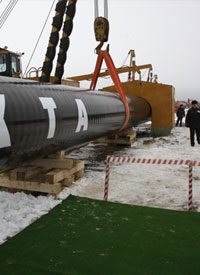
OPEC of Natural Gas
In December, Russia scored some significant energy coups, hosting the 7th annual meeting of the Gas Exporting Countries Forum (GECF), often billed as the "OPEC of natural gas," and signing an exclusive pipeline deal with Turkmenistan, which recently boasted discovery of one of the world’s largest natural gas fields. At the same time, Russia also warned that Europe could face cut-offs of natural gas due to Russia’s on-going dispute with Ukraine over an alleged debt of $2 billion.
The Moscow meeting of the GECF signaled a key development in the global natural-gas picture, with the previously informal association adopting a formal charter and establishing a headquarters. Founded in Tehran in 2001, the 15-member GECF includes the world’s largest natural-gas suppliers, many of which are less than ideal energy partners for the United States. Its members, which account for about 73 percent of the world’s gas reserves and 42 percent of production, include Algeria, Bolivia, Brunei, Egypt, Equatorial Guinea, Indonesia, Iran, Libya, Malaysia, Nigeria, Qatar, Russia, Trinidad and Tobago, the United Arab Emirates, and Venezuela.
Since 2002, Russia has been pushing to transform the grouping into an actual OPEC-style cartel. Russian Prime Minister Vladimir Putin, who first floated the idea while he was president, addressed the GECF ministers at the recent Moscow summit, announcing "the era of cheap energy resources, of cheap gas, is of course coming to an end." "We would be glad to host this organization in the Russian Federation … and are ready to give it diplomatic status and cover related expenses," Vladimir Putin told the GECF attendees. The GECF ministers, however, opted instead to establish the new headquarters in Doha, Qatar.
Many Western oil and gas companies that had been hoping to get in on Turkmenistan’s gas bonanza were disappointed to learn that the communist-dominated government of President Gurbanguly Berdymukhamedov has decided to stay joined at the hip with Moscow on energy policy, offering Western firms only service contracts rather than the hoped for more lucrative partnerships. The main exception to this rule has been the China National Petroleum Corp. (CNPC), which has a big production sharing agreement with Turkmenistan and is also building a pipeline to take the gas directly from Turkmenistan to Communist China.
Meanwhile, environmental militants and "green" politicians in the United States claim to favor a shift away from "dirty" coal and oil toward more use of natural gas, but they have not moved to ease the inhospitable regulatory burden associated with drilling, producing, and transporting natural gas in the United States. If that does not change, U.S. consumers will become increasingly hostage to foreign sources of natural gas and more dependent on a global gas market dominated by Russia, China, Iran, and Venezuela.
Photo: AP Images



